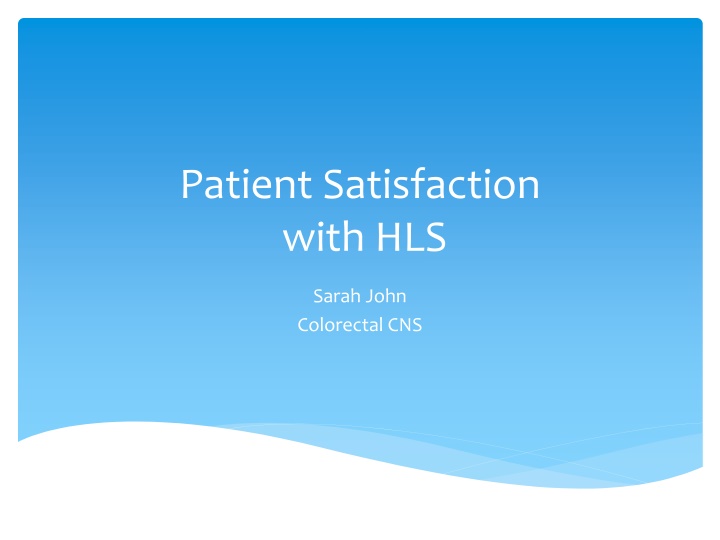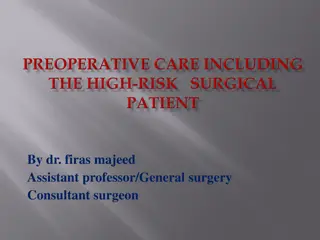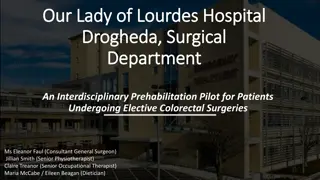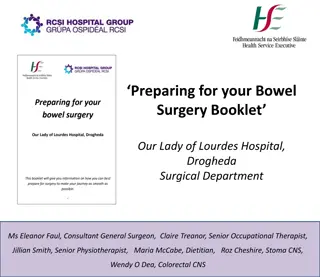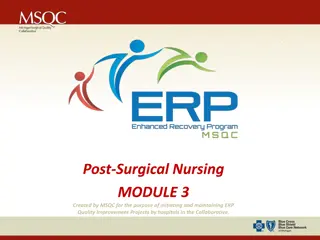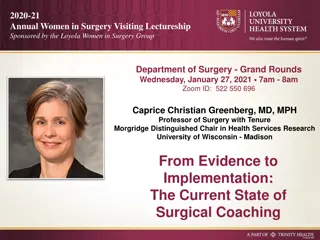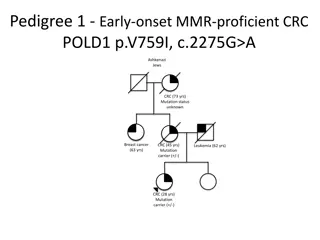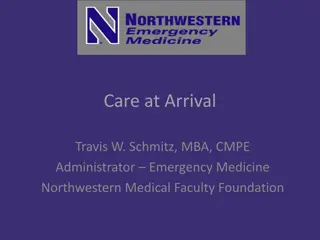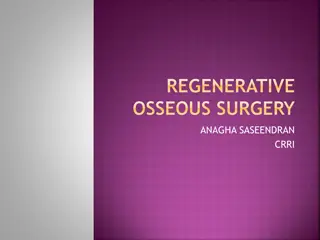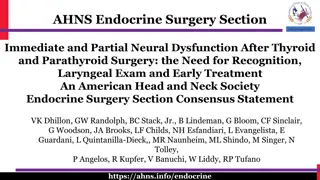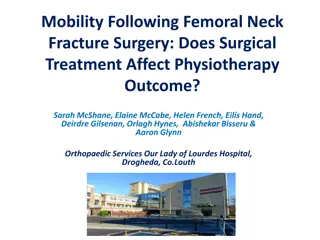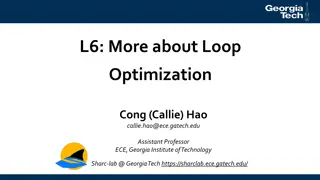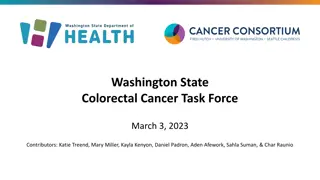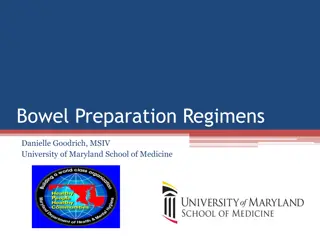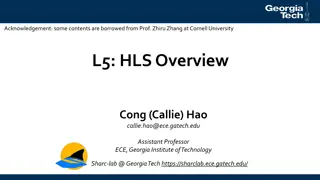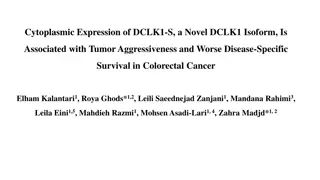Patient Satisfaction with HLS Programme and Colorectal Surgery Outcomes
Patients express high satisfaction with their experience in the HLS programme, reporting confidence in the care provided and timely test results. Colorectal surgery outcomes show positive results with disease-free patients and successful resections. The decision to defer surgery for sustained cCR is discussed, with a Watch and Wait protocol showing potential benefits in select cases.
Download Presentation

Please find below an Image/Link to download the presentation.
The content on the website is provided AS IS for your information and personal use only. It may not be sold, licensed, or shared on other websites without obtaining consent from the author.If you encounter any issues during the download, it is possible that the publisher has removed the file from their server.
You are allowed to download the files provided on this website for personal or commercial use, subject to the condition that they are used lawfully. All files are the property of their respective owners.
The content on the website is provided AS IS for your information and personal use only. It may not be sold, licensed, or shared on other websites without obtaining consent from the author.
E N D
Presentation Transcript
Patient Satisfaction with HLS Sarah John Colorectal CNS
How have you found being in the HLS programme? After first 3 moths got into a routine. Felt prepared and felt had settled in to a pattern happy with plan to date, has just got on with it and is better than having a bag Caused no concern and became routine. Biggest issue was with the enema!
Were the tests on time, did you have to chase appointments? Excellent service Test on time and enough notice to tell work Had to chase once and then heard with in 2-3days of an appointment.
Were the results given in a timely manner? Surgeon gave results at time of endoscopy Yes but if did not hear, assumed was ok Very quickly
Confidence with service? Very confident with the surgeon and information given at time of deciding what to do. Feels confident and very lucky Complete confidence
Overall satisfaction score out of 10 9 9 8 (not 10 due to waiting time in endoscopy department)
6 patients on HLS from 2012 Currently no recurrent disease or metastatic disease.
UPDATE 6 patients remain disease free. One further added Jan 2018 who at diagnosis had liver met and had a successful liver resection showing no residual disease. Continued on HLS. One recent Feb 2020 added.
Patient information from Pelican Cancer foundation Am I missing an opportunity for a better result if I defer surgery in the hope of sustained cCR? The majority of patients entered into a Watch and Wait protocol with a cCR were originally expected to have surgery. Patients may enter a Watch and Wait protocol if their tumour has regressed (shrunk). If the tumour does not regrow, there may be the opportunity to avoid surgery, preserve the rectum and retain better bowel function. Whilst clinicians at the Pelican meetings were positive about deferring surgery, the research evidence is controversial; studies are mostly retrospective cohort studies and there remains uncertainty amongst some clinicians about this treatment option. Am I more likely to suffer metastatic disease if I adopt Watch and Wait, rather than excision? Patients with Stage II or III rectal cancer have up to a 35% risk of developing metastases 13. In the studies presented at the meetings, the metastatic rate for patients with a cCR varied, with an average metastatic rate of approximately 8% (unpublished data). Do a reasonable number of colorectal surgeons in the UK agree with Watch and Wait? These two meetings brought together more than 100 clinicians and presented data from the Christie Hospital in Manchester, which included data from four hospitals in the UK who followed up patients with a cCR. In 2007 and 2013, questionnaires were sent out to surgeons in England, 122 and 138 surgeons replied and there was a shift in the six year period, with the more recent survey reporting that 64% said they would discuss Watch and Wait management for rectal cancer with their patients14, 15. Does cCR equate to my nodes being clear? Absolute certainty that the nodes are clear can only be achieved by pathological assessment, which requires an operation. However, radiological imaging features can be used to diagnose and monitor suspicious nodes.
If I get regrowth post-CRT, what is my chance of cure, compared with a recurrence after surgery? This is a different concept to recurrence after surgery since no tumour has been removed, and is therefore referred to as a regrowth. The majority of patients who have a regrowth can have salvage surgery12. This has been shown by centres in Brazil, Holland, USA, Denmark and UK with patients having good outcomes in terms of disease-free survival. What is the chance of a local relapse with Watch and Wait? Between 20 to 38% of patients who have a cCR and join a Watch and Wait protocol have a regrowth compared to <10% recurrence after surgery. However the prognosis is completely different between the two as a regrowth can still have successful salvage surgery. Am I trading life expectancy to avoid a permanent stoma? How much life expectancy? There does not appear to be a trade-off in life expectancy and, in fact, good or complete response is a marker of good prognosis. Do many patients in the UK accept the risk of Watch and Wait? This is increasingly common. In the published literature, 129 patients from north-west England5 and 6 patients from Exeter16 have avoided surgery and been followed up with a Watch and Wait protocol. But many more patients with a cCR from individual centres are avoiding surgery. Will the follow-up needed for Watch and Wait be different from that after post-CRT resection? In what way? Follow-up after surgery varies, but will mostly include an annual CT scan, blood tests and full colonoscopy in varying frequency. Most centres will discharge patients after 5 years if that patient is disease free. In Watch and Wait, more frequent follow-ups are recommended and includes MRI scan with more frequent endoscopy. Am I more likely to need secondary chemotherapy after Watch and Wait, compared with timely resection? There is no evidence that adjuvant chemotherapy has any benefit in patients managed under a Watch and Wait programme. Some centres will give additional chemotherapy to some patients, but this is not standardised. If I do not respond to CRT, would you recognise my non-response? Patients who do not have a cCR will go on to have surgery. If not, would I be disadvantaged by delaying definitive surgery? The published data and results of these two meetings suggest that patients are not disadvantaged by delaying surgery in patients with cCR.
